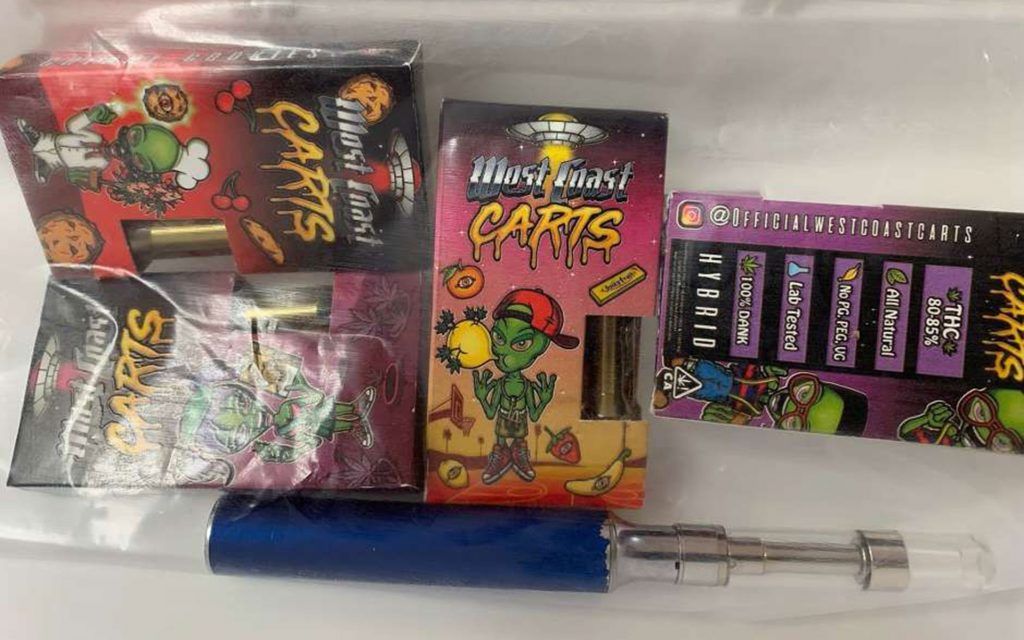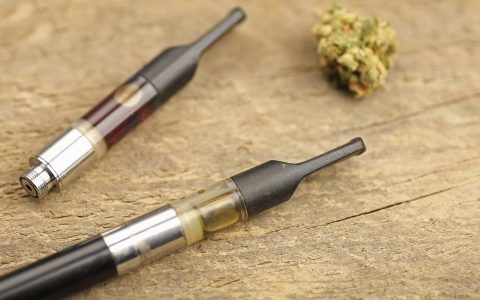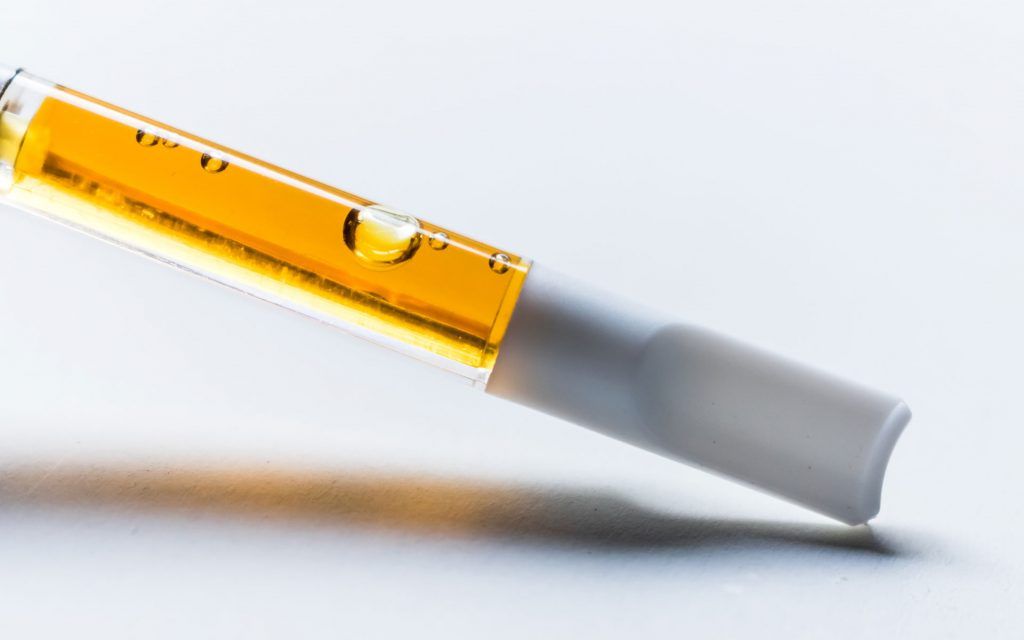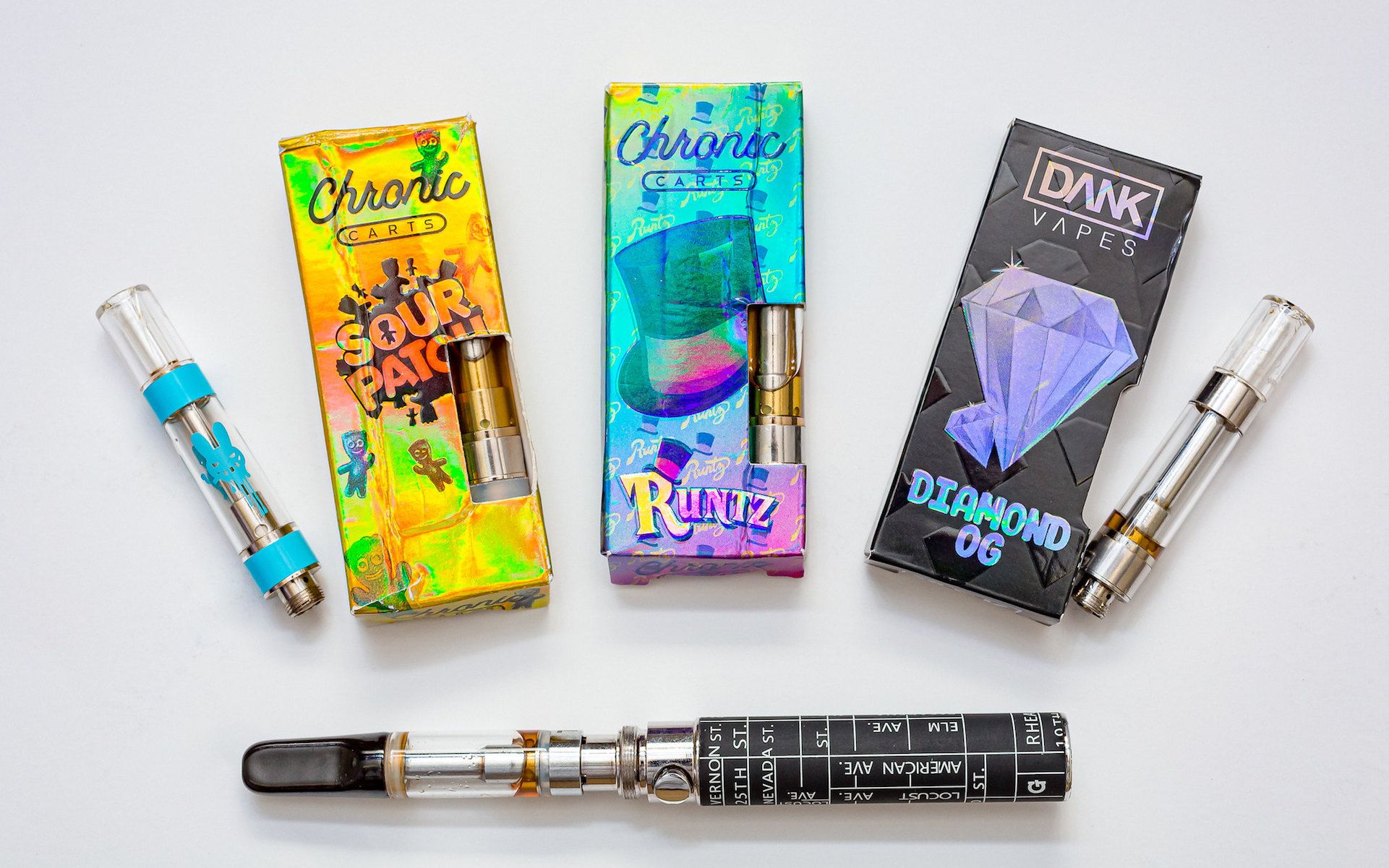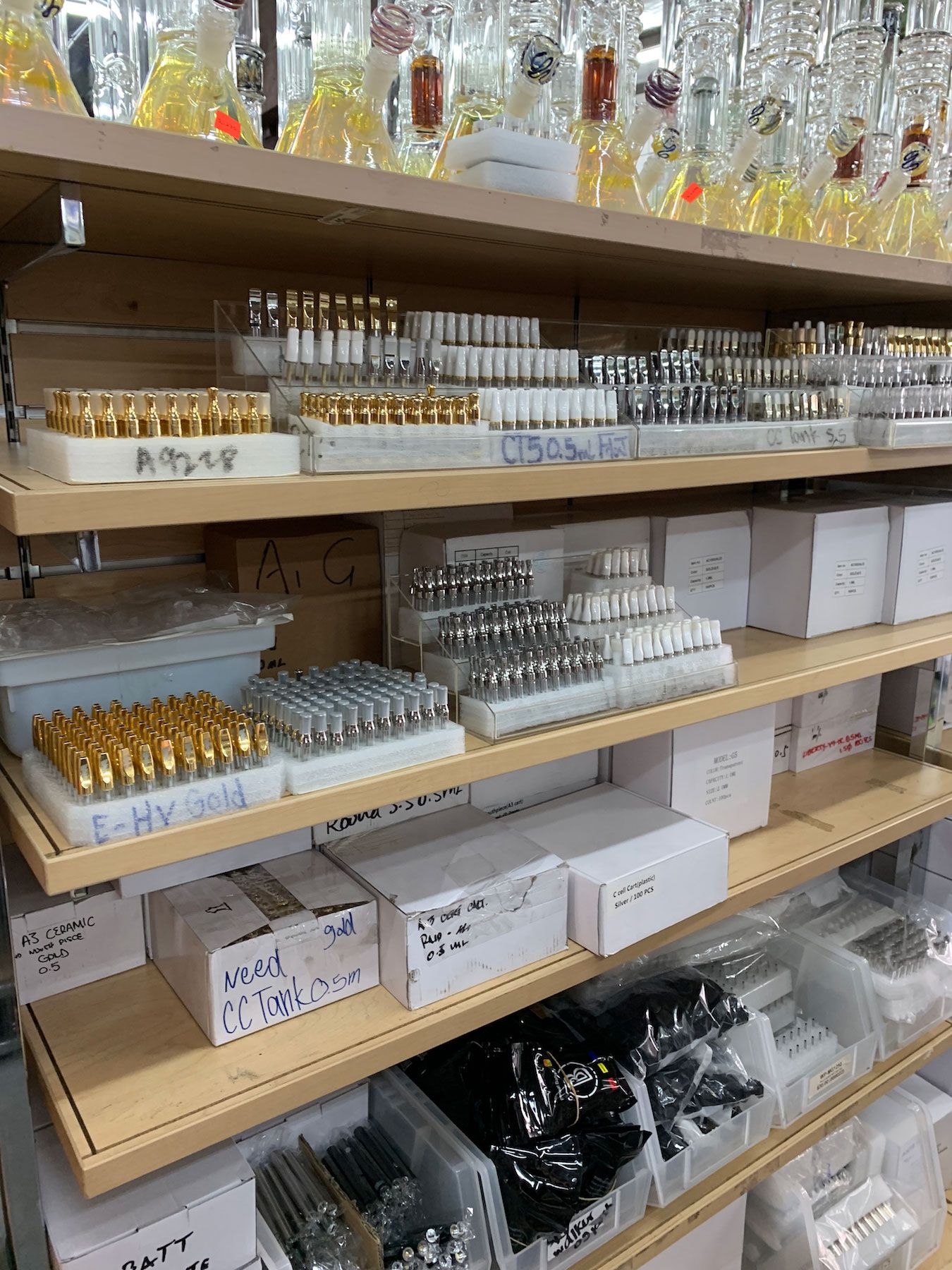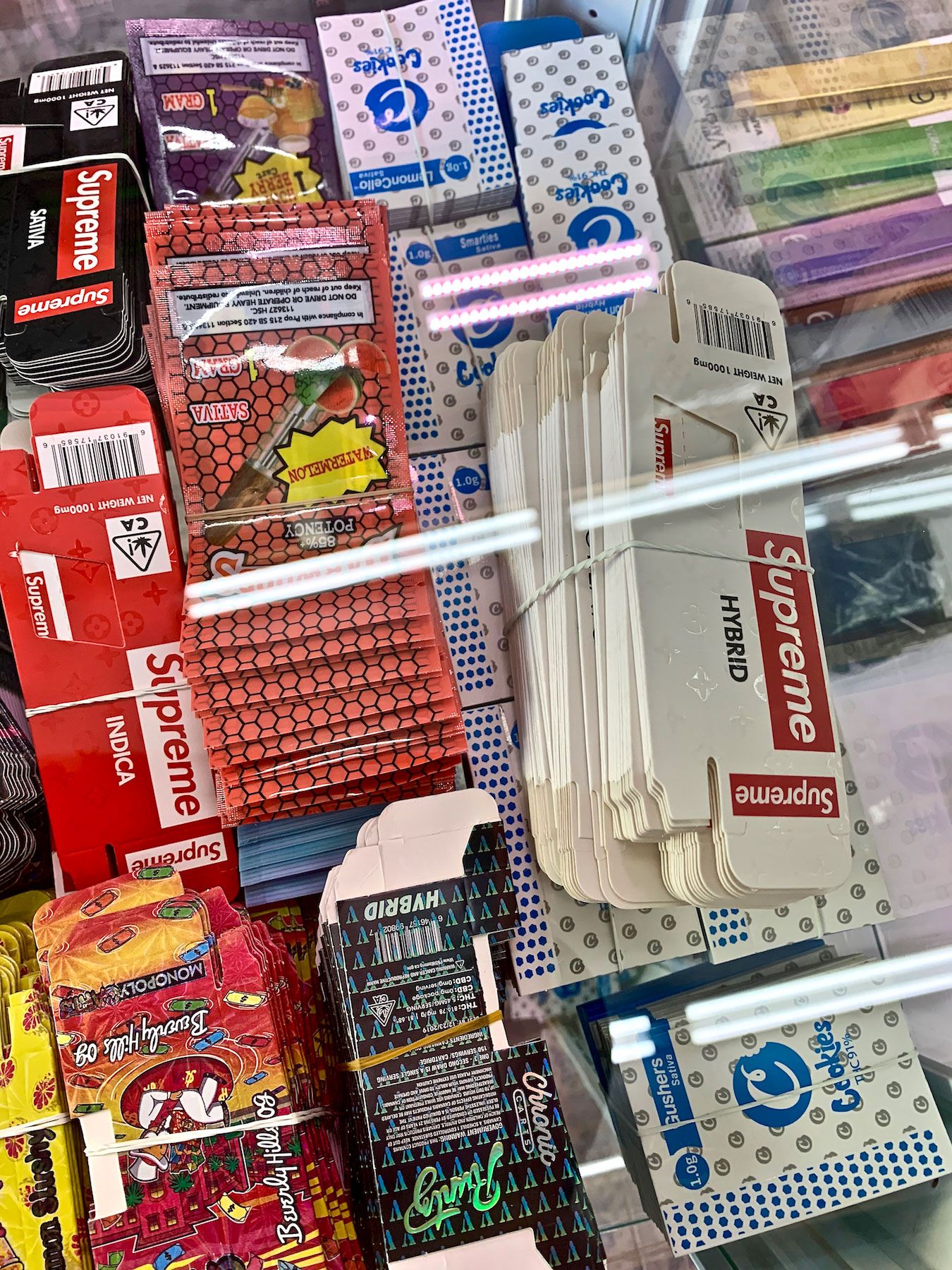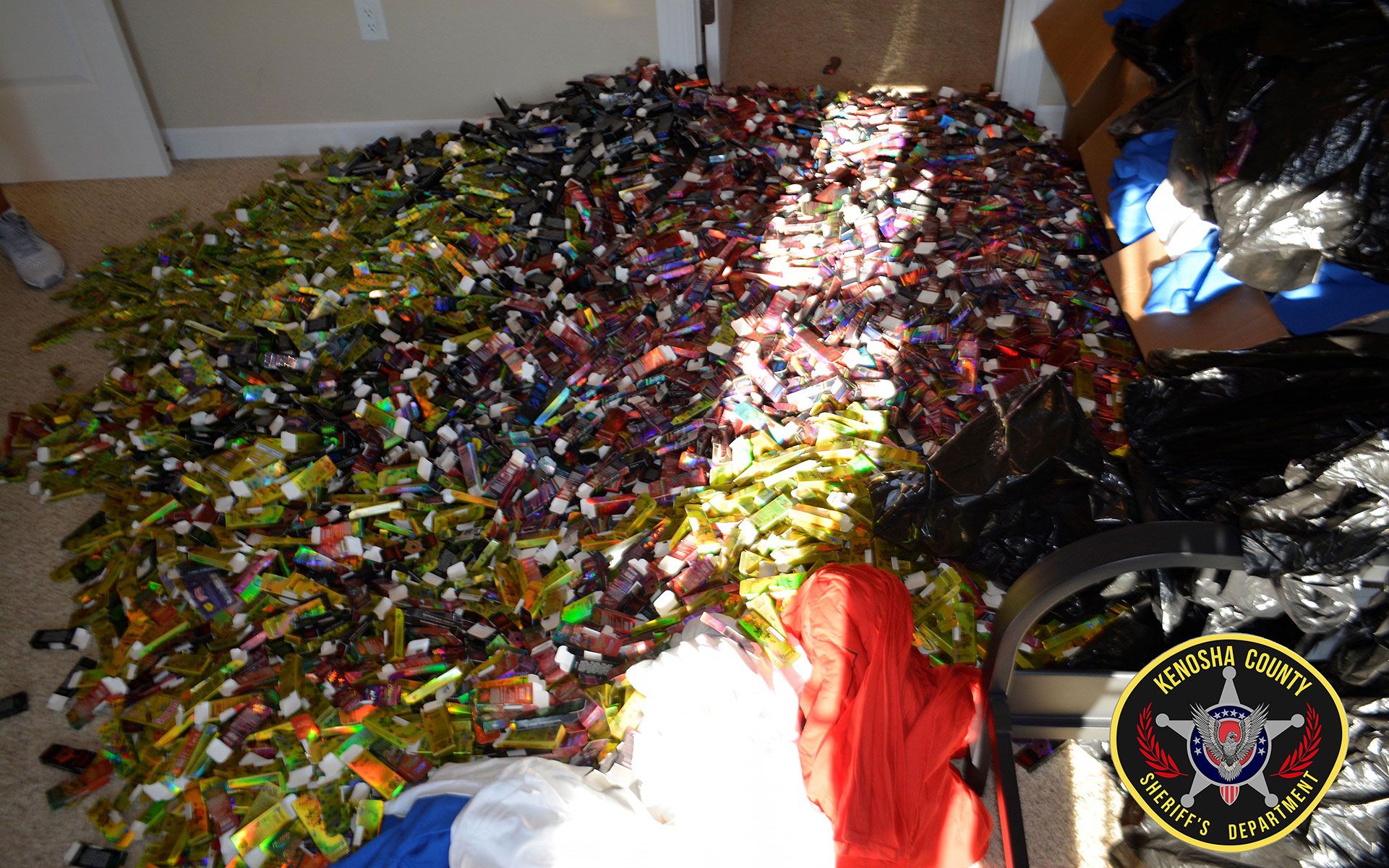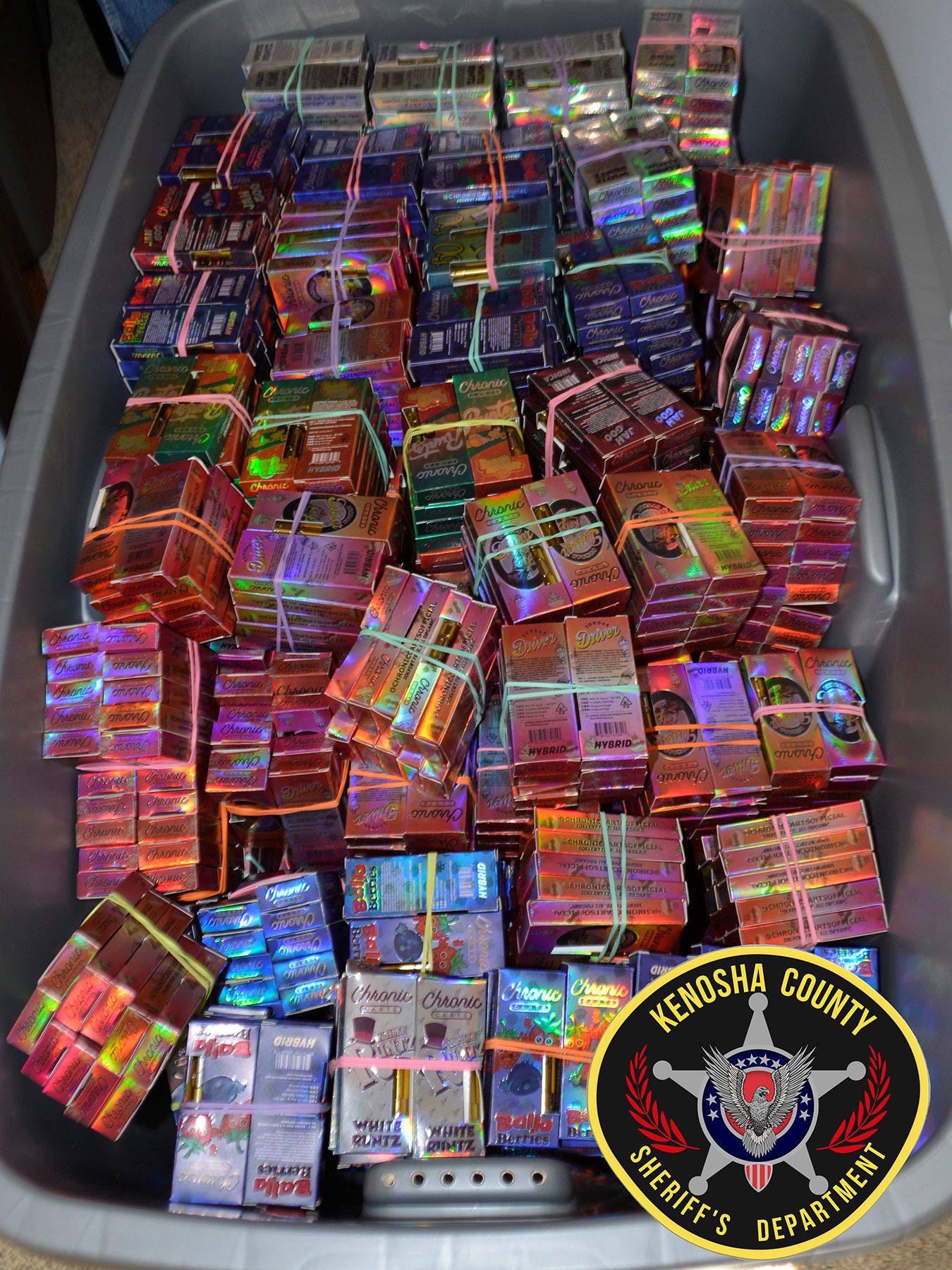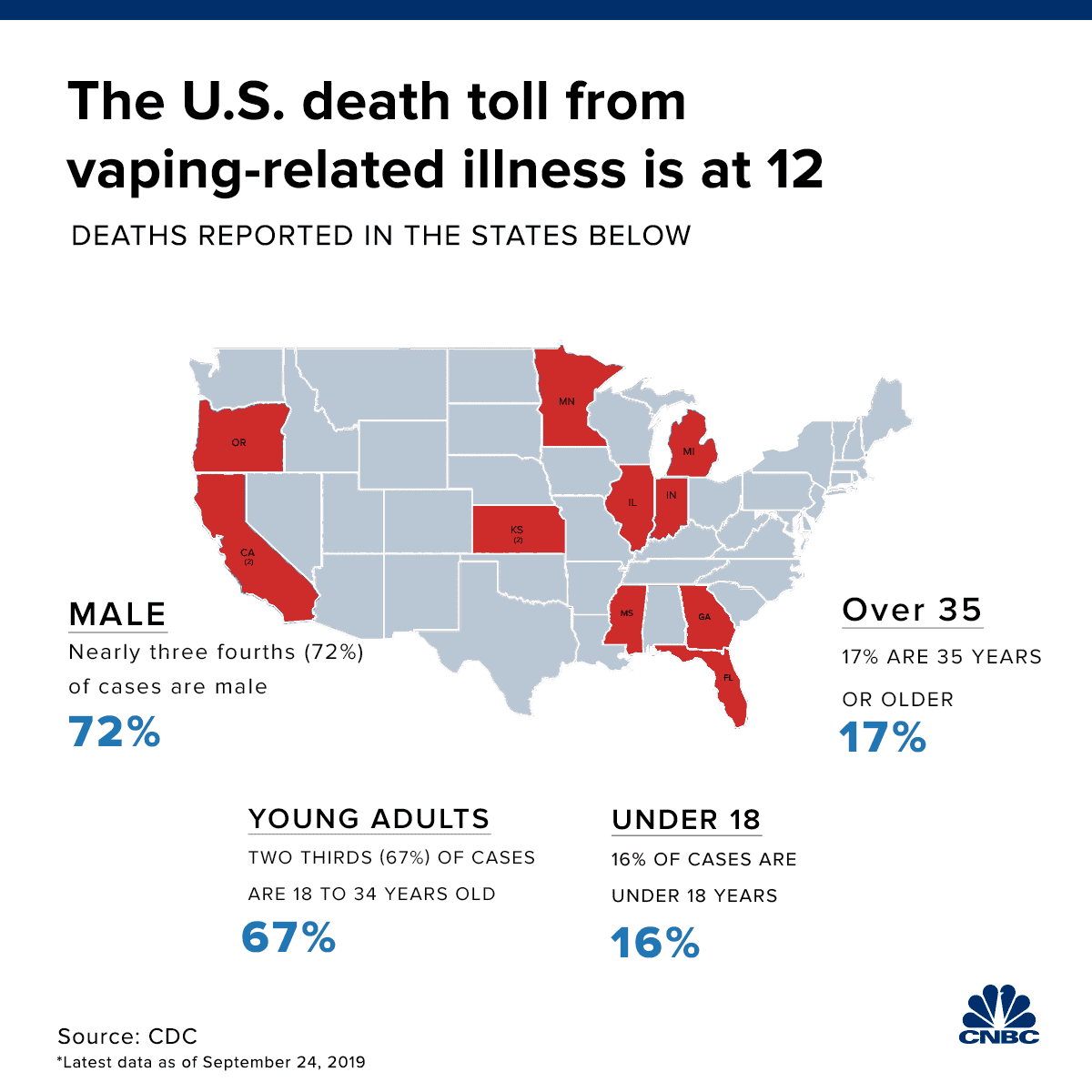Journey of a Tainted Vape Cartridge: From China’s Labs to Your Lungs
Leafly's investigation tracked a contaminated global supply chain for illicit market THC vape cartridges. (HighGradeRoots/iStock)
Jon Doneson started feeling ill on a Friday morning in June, after he arrived home in New York on a red-eye flight from the West Coast. He’d traveled to China, then to California, as part of his job managing the back office of his wife Susan’s apparel company. He hoped to re-acclimate to Eastern time, so rather than resting he went to the gym. But he became ill after his workout, vomiting violently and sweating heavily.
Doneson, 52, wrote it off to fatigue. In subsequent weeks Susan pointed out that he had a strange cough. But to Doneson it wasn’t particularly bothersome.
Susan and Jon Doneson fought Jon’s strange lung illness for weeks. They didn’t suspect a THC vape pen until a pulmonologist noticed that he’d mentioned it on an intake form. (Courtesy of Jon Doneson)
Then, on August 12, he woke up around 5:30 a.m. feeling something different.
Jon Doneson was quarantined and fighting for his life. Then a pulmonologist recalled that he'd mentioned using a vape pen.
“The cough was actually very painful,” he says. He experienced night sweats. He had a fever and pain. His doctor diagnosed bronchitis, but the prescribed meds failed to dent the symptoms. At a follow-up visit, a chest X-ray indicated that Doneson had double pneumonia. This time his doctor prescribed doxycycline for the infection.
About ten days later, though, Doneson felt so awful that he asked his wife to take him to the doctor, who told him to go straight to the emergency room. When doctors at Manhasset’s
North Shore University Hospital learned he’d recently visited China, they quarantined him and tested him for various ailments. All came back negative.
Next came a battery of nearly a dozen infectious disease specialists and Centers for Disease Control officials. They clustered around Doneson, who even in his feverish state knew how surreal the scene looked—bed-ridden in a pressurized room with a red quarantine sticker on the door. As he recalls it, “I was totally in disbelief.”
Sickened lungs show up as cloudy on the left x-ray, and clear after treatment of one suspected VAPI patient in Utah. (Courtesy University of Utah)
Doneson, a Queens native who now lives in Roslyn Heights, considers himself a healthy person. He runs and works out, doesn’t smoke, rarely drinks. He never dreamed he’d be the patient in a scene out of a Hollywood contagion movie.
As his situation worsened, doctors asked Susan Doneson to fill out a ‘Do Not Resuscitate’ form. She was emotionally devastated. Jon tried to calm her. “Listen,” he told her, “I had a rock star of 52 years of a life.” But he wanted to stay alive for their 10-year-old son.
He might have died had a pulmonologist not noted a small detail while obtaining his medical history: Doneson said that a few months earlier, he’d started using a THC vape pen.
North America’s Illicit THC Vape Market
Illicit market THC carts containing high levels of vitamin E oil, confiscated in New York. (Courtesy New York State Department of Health)
As the world now knows, a multi-billion dollar marketplace exists for illicit THC vaping devices and cartridges. Millions of street consumers use them, and unlike vape carts purchased in state-licensed medical marijuana dispensaries and cannabis stores, illicit products lack regulation and mandatory testing for potency or purity. Recent reports have estimated that America’s legal, regulated cannabis industry accounts for only 22% of the nation’s $52 billion in cannabis purchases. The other 78% of the THC market remains untested and out of control.
Until this year, the health effects of street-purchased vape cartridges went largely unnoticed. It’s not clear whether that’s because doctors didn’t spot earlier vape-related lung irregularities, or if something dramatically changed in the vaped oil itself in the past few months. What we know is this: Near the end of 2018,
a new additive entered the street THC vape cart supply. And hundreds of
serious pulmonary injuries, and possibly as many as nine deaths, followed.
Public health officials and labs have discovered the new additive—a form of
vitamin E oil used as a cutting agent—tainting a large amount of the devices that sick people reported using. At Leafly, we wanted to know how that additive entered the market, and why.
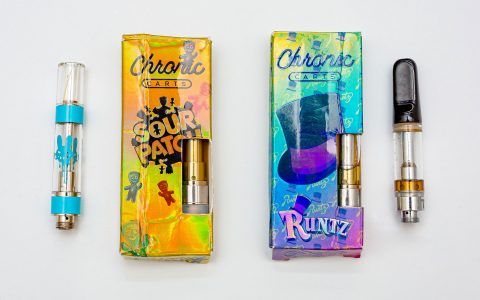
Our team of reporters and editors investigated the origin of the various components of a street-market THC vape cartridge. Ultimately, we were able to identify a contaminated supply chain that begins in the manufacturing centers of China, runs through the wholesale markets of downtown Los Angeles, disperses to regional pen-filling operations, and finally ends up in the hands of unsuspecting consumers like Jon Doneson.
The supply chain begins in China, runs through Los Angeles, disperses to regional pen factories, and ends up in the lungs of unsuspecting consumers.
It’s important to note that this supply chain is not coordinated or controlled by powerful drug cartels. Companies small and large operate independently at every link in the chain.
Along its journey each vape cartridge—also known as a cart—may pick up lead (the toxic heavy metal), pesticides, unsafe additives like vitamin E oil, and the residual solvent butane. Each of these ingredients can cause lung injury. As many as 50 million of these tainted carts may currently be circulating in the United States. Since the federal Centers for Disease Control (CDC) began tracking VAPI (vaping-associated lung injury) in July 2019, the agency has documented 530 confirmed or probable cases of injury. The CDC expects that number to climb.
Most VAPI victims used THC carts purchased in the illicit street market. Many used THC and nicotine carts, and some claim to have used nicotine only. All three products can be manufactured with the same hardware. The same supply chain that produces tainted THC vapes also yields dirty, counterfeit JUUL pods for the nicotine market, and
tainted CBD carts for the CBD market.
Peter Hackett is the owner of
Air Vapor Systems, a Concord, California-based company that imports vaporizer cartridges. He says it takes less effort to get into the fake JUUL or cheap CBD cart game than it does to get into the tainted THC cart game.
“It’s ten times easier,” he says. “You can buy nicotine on Amazon. Same for CBD. Every constituent up till the THC oil is exactly the same.”
Public health officials have raised the alarm about illicit THC vape cartridges for more than two months now. In early September,
Leafly identified the suspected toxic substance—tocopheryl-acetate (vitamin E oil)—and the brand names of the vape cart additives containing it. Although some companies have
stopped selling them, tocopheryl-acetate cutting agents remain largely available for purchase and in the illicit THC vape cart market still today.
Step 1: Cheap Hardware From Chinese Factories
Type in “empty” and “cartridge” into the e-commerce site Alibaba, and dozens of Chinese manufacturers pop up, offering to make them to order. The cheapest run about 59 cents per cart, if you order 10,000 or more. For a few pennies extra you can have a customized logo engraved on each tank. The same manufacturer will create packaging, too. Just say the word and send the money.
If you’re vaping something illicit, it was probably made in the Bao’An district of Shenzhen.
More than 95% of North America’s illicit vape pen hardware is manufactured in the Bao’An District of Shenzhen, China, says Peter Hackett, the industry expert who regularly does business there.
“If you’re vaping something, it was made in Bao’An in Shenzhen,” he says. “There’s over 1,000 factories and hundreds more [getting in the game] every day.”
Many factories are “little more than a collection of people trying not to starve,” added Hackett. “They’ll make you anything.”
Last year those factories were making fidget spinners. This year they’re turning out empty vape cartridges, fake JUUL pods, and counterfeit packaging.
Workers bundle those cartridges and packages, then shrink-wrap, pallet, and load them onto a cargo container ship. Twenty days later they arrive at the
Port of Los Angeles and Long Beach, CA, the busiest container port in the United States. From there, they go either to the direct-mail customer or to brokers in the Toy District in Los Angeles.
Step 2: The Los Angeles Wholesale Market
Cheap imported vaping hardware can be had at wholesale volumes and prices in downtown Los Angeles. (David Downs/Leafly)
The center of North America’s illicit vape cart industry is a 12-block region near LA’s Skid Row. It’s known as the Toy District, because years ago it served as the center of America’s cheap wholesale toy industry. Today it remains the place to buy low-quality imported goods in large lots: toys, restaurant equipment, party supplies, votive candles.
LA's Toy District serves as the nation's cheap-goods wholesale market, and the vape stores are booming.
Between East 3rd and Boyd, it’s all vapes, vapes, and more vapes. It only takes a wad of cash and an hour of haggling to buy everything you need to begin harming consumers with an illicit market THC vape cart, a fake JUUL pod, or something advertised as CBD.
Why bother to purchase at a brick-and-mortar store when Alibaba can ship it direct? Because Alibaba requires a credit card and leaves a digital footprint. LA’s wholesale market deals in cash.
“If you sell $300,000 in [illicit vape] carts, you can’t walk into a bank with that. You have no stated business,” Hackett explains. “Third Street is an easy place to go in with dirty cash, and come out with more supplies.”
On Friday, Sept. 13, a Leafly investigative team wandered through this neighborhood spotting empty vape carts and counterfeit empty Juul pods. LA’s Toy District is not a high-rent neighborhood. Just blocks from ritzy new downtown condos, addicts openly inject drugs on the sidewalk. A homeless guy wanders in and out of street traffic without pants or underwear. You breath shallow in the thick car exhaust.
Each storefront is dingy, poorly lit, and stocked with disheveled, half-open cardboard boxes and sales racks. Big metal fans blow the hot air around, while radios buzz loud scratchy music. Every item you’d find in a head shop or vape shop, you’ll find here wholesale—like some loud, chaotic vape bazaar.
Vape Hardware: Cheap, Cheaper, Cheapest
Every type of vape cart, for wholesale in downtown LA. (David Downs/Leafly)
Walking in and out of the rows of wholesale vape supply stores, we posed as aspiring vape pen makers, “just doing some pricing for our boss.”
In each store, a salesperson quickly walked up and peppered us with questions. “What you looking for? … What size? … Ceramic? … You need packaging? … Minimum order is 100. … Yeah, prices go down after 1,000 units. What brand you with?”
There is no difference between an empty vape cart destined to hold THC, versus one for nicotine, or CBD. It’s all for sale, from the same people, to anyone with cash.
It’s an open question whether the carts sold here would pass California’s tough adult-use cannabis testing standards. Since testing started on Jan. 1, 2019, labs have quarantined many vapes for
too much lead—either because of the lead in the metal itself, or because factories wash the finished product in diesel fuel, which leaches lead into the carts.
Unsafe Additive Available Too
Honey Cut advertised for sale alongside empty carts in downtown LA. (David Downs/Leafly)
In addition to the low quality hardware, LA’s Toy District vape wholesalers sell the dangerous additives not approved for human inhalation— including dubiously sourced terpene flavorings and hazardous diluent thickeners like vitamin E oil. You can also purchase more traditional diluents like propylene glycol, polyethylene glycol, and vegetable glycerin.
Vitamin E acetate is still available for purchase in LA, despite health warnings.
These chemicals also get made in China. Many come in packaging labeled as “FDA-approved” and “generally recognized as safe” (GRAS). But a
previous Leafly investigation found that those designations, with regard to vitamin E oil, apply only in cases of oral ingestion (eating) or application to the skin, not for vaporization and inhalation. They comprise a tame part of the global cosmetics and supplements industries. Street markets divert the drums, pails, and gallon jugs of these chemicals into the vape channel.
Among all the additives, there’s one that makes every vendor in the Toy District tense up and start shaking their head: “Honey Cut.”After asking around, our local guide ‘Marcus’ reported that “you won’t find anyone down here selling it.” He said news reports have frightened it off the shelves. “They’re scared to sell it.”
https://www.leafly.com/news/health/vape-pen-lung-disease-vitamin-e-oil-explained
Honey Cut swept through the Toy District in late 2018. The groundbreaking product, produced by a mysterious company in Los Angeles, offered manufacturers the ability to cut THC oil concentrations by 50% to 70% without consumers noticing—because instead of thinning the viscosity of the vape oil, it actually thickened it. (Consumers use oil thickness as a proxy for purity.) Honey Cut is odorless, tasteless, and didn’t make consumers cough, so they could inhale it deep into their lungs. And it was cheap, too.
Why would manufacturers want to cut THC oil? The same reason they’d cut any street drug: to make more money. Thanks to the math of cutting, a vape cart maker could spend $50 to produce $4,800 in revenue. How? Hackett explains:
Take a liter of bulk THC oil—it’s pricey at $6,000. Now increase its volume by 30% with vitamin E oil (300 ml for $50). As long as no one notices, you now have 1,300 mls of THC oil worth $7,800, having spent just $50.
Furthermore, retail markup magnifies the profits of cutting. Each 1-gram street cart retails for $16. (A licensed, regulated, and tested cannabis oil vape cart in a legal adult-use state like California or Washington typically retails for $40 to $60.) So $16,000 in uncut oil becomes $20,800 in cut oil. You just made almost $5,000 extra dollars by adding $50 worth of invisible poison to the mix.
Honey Cut Inspired Copycats
Leafly has learned that as many as 40 brands—some legal, some not—quickly copied Honey Cut. They paid lab technicians to specify the chemical formula, and started selling their own versions. Some major, legitimate additive brands followed suit. Some initial sellers misread the research and FDA signal on the safety of vitamin E oil. Others didn’t care and just followed the fad to bank the profits.
Floraplex released Uber Thick— which two lab tests confirmed is vitamin E oil. Mass Terpenes put out Pure Diluent—also vitamin E oil, New York authorities said. And Mr Extractor of Oregon released Clear Cut—same thing. Vitamin E oil use peaked this summer, right as the VAPI poisonings ramped up. Vitamin E oil might be in 60-70% of street carts, insiders say.
We went to the The Terpene Lab at 330 E. 3rd St—the same place where Mr Extractor founder Drew Jones
filmed a YouTube video advertising Clear Cut for use in heavy amounts, nationwide. The product name “Clear Cut” still sits on printed menus at the bar. But when we ask the salesperson for thickener, she asks a manager who quickly barks back, “No! We don’t have any! No!”
The makers of Honey Cut called every vendor in the Toy District after Leafly’s Sept. 7 article, which named Honey Cut as a potential cause of the injuries. The company told them to stop selling it: ‘It’s recalled. It’s not safe.’ Honey Cut’s website and ordering page disappeared.
Other manufacturers have since suspended sales of their thickeners. Floraplex and Mr Extractor no longer offer Uber Thick and Clear Cut, respectively.
Still, in the Toy District, one vendor offered to sell us thickener under the table, outside of the store.
At a store called Cali Kulture, we bought some of the last diluent thickener overtly for sale in the Toy District. It’s called Peak Terpenes Thicc Stretch and it’s priced at $90 for 30 milliliters. The label says it’s a secret mix of fruit, nuts, and other plant oils, and there’s a nut allergy warning. It’s clear, innocuous smelling, and viscous like honey.
Leafly had SC Labs, an independent cannabis testing company with laboratories in California and Oregon, analyze the substance. The report found that it’s almost all vitamin E oil. Peak Terpenes has since pulled the product from its online catalog.
“These products are great if you want to make beard oil,” says Arnaud Dumas de Rauly, a vape hardware expert at The Blinc Group. “The vitamin E oil acts as a preservative. It’s good for your skin. It’s not great for your lungs.”
Furthermore, that nut allergy warning won’t get passed down by the person who fills an illicit pen and sells it, De Rauly said. Just imagine what inhaling peanut oil would do to someone with a nut allergy. It could kill them.
Right after we bought Thicc Stretch, Cali Kulture staff got spooked and pulled the last of the red bottles off the shelf.
Fake Packaging Available Too
To illicit vape cart manufacturers, fake and counterfeit packaging is just as important as cheap hardware and thickeners. Street consumers also shop by brand, so Toy District stores compete to offer the most diverse array of counterfeit or popular street designs around. That includes the popular black market brands Dank Vapes and Chronic Carts, brand names with no actual company behind them. Wholesalers also offer counterfeits of packaging from legal licensed brands like Cookies, STIIZY, and Brass Knuckles.
At one wholesaler, a saleswoman asked a Leafly editor about the Connected Cannabis Co. T-shirt he wore. Connected is a popular state-licensed cultivator and retailer in California.
“Hey, where did you get that shirt? Do you work for them? No? Good, because if you did, I would have to throw you out.”
“Why?” the editor asked.
“We sell [counterfeits of] their bags,” she said, and smiled.
At a store called Cart Cartel, we were told they had sold out of Dank Vapes boxes. Their next shipment was due in the following Tuesday. “Call us first,” a salesman told us. “We always get the packages first around here.”
Counterfeit packaging for sale in downtown Los Angeles. Supreme and Cookies are both popular state-licensed brands, and illicit manufacturers copy their design changes as soon as they’re made. (David Downs/Leafly)
We returned to one of the biggest, most prominent stores—Cali Kulture, at 306 Wall St.—where we haggled and agreed to buy Dank Vapes packaging, a minimum order of 1,000 packages, for $120.
At a smaller shop near Cali Kulture, we bought the exact Chronic Carts Runtz strain packaging found on a VAPI victim in New York. The dealer sold us 20 units for $2. His next-door neighbor took one of our team member’s mobile phone number and now sends regular texts advertising new products.
At the end of the day, here’s what we walked away with: five sample vape carts; 1,000 units of fake-brand packaging with professional-looking designs and names like DANK and Chronic Vape—the same bogus brand packages that public health officials have seized from VAPI patients injured in New York and California; and perhaps most disturbingly, we bought 30 milliliters of chemical cutting agent—known as thickener—weeks after Leafly identified them as a leading suspect in the lung injuries. These cutting agents were never approved for inhalation, and can cause an allergic or toxic lung reaction.
All of this hardware, chemicals, and packaging is technically legal until you put an illegal drug into it. We spent a total of $210. We kept the receipts.
Step 3: Regional Pen Factories
Los Angeles hosts the national hub for illicit cartridge parts and THC oil additives, but the cannabis oil that goes into those carts is manufactured in regional facilities around the country. This is often a house or condominium rented as a residential space, but secretly used as a butane hash oil manufacturing lab.
Contaminants coming from this process include concentrated pesticides like myclobutanil—which turns into toxic
hydrogen cyanide when burned—as well as residual solvents like butane, propane, pentane, and hexane. All are known lung irritants.
These THC oil labs then wholesale bulk distillate via online sites, or through their own networks to “pen factories”—places that bring all these inputs together.
Law enforcement officials allege this pen factory in Wisconsin stocked tens of thousands of fake-brand packages for illicit vape cartridges. (Courtesy of Kenosha County Sheriff’s Department)
Each pen factory might employ as many as a dozen workers at $10 to $20 an hour.
The setup at a house allegedly rented by the Huffhines brothers in Bristol, Wisconsin, seems typical. Bristol is a Kenosha County village about 40 miles south of Milwaukee. It’s a short commute east of the town of Paddock Lake, where Tyler Huffhines, age 20, and his older brother Jacob, 23, live with their parents.
Though barely out of his teens, Tyler already had a reputation as something of a business prodigy. The Kenosha News wrote a story about him in 2018 when the Central High School student ran his own online shoe company. The headline was, “Who Wants To Be a Millionaire?”
Tyler Huffhines. (Courtesy Kenosha County Sheriff)
After graduation, law enforcement officials allege that Tyler pivoted from sneakers to illegal THC vape cartridges. According to the Kenosha County Sheriff’s Office, the Huffhines brothers rented a condominium in Bristol and invested in tens of thousands of empty vape cartridges and product packaging.
Law enforcement officials
contend that the Huffhines brothers purchased illicit-market cannabis oil from unlicensed producers in California, then combined it with other ingredients in the Bristol condo. Court documents state that deputies discovered 57 glass Mason jars filled with the oil when they searched the residence.
In locations like the Huffhines brothers’ Wisconsin condo, the cannabis oil can come in a variety of containers. Tocopheryl-acetate (vitamin E oil) is sold in volumes ranging from ounces to full metal drums. Workers cut the THC oil with vitamin E oil or other unsafe thickeners, add in some flavoring also not approved for inhalation, and syringe one milliliter of the mix into each 1-gram vape cartridge.
The filled cartridges get placed into pre-printed packaging material purchased from the Los Angeles wholesale markets. At the Huffhines condo in Wisconsin, thousands of filled vape carts were allegedly sealed into packages with the Dank Vapes and Chronic brands—exactly the kinds of boxes purchased by Leafly in LA’s Toy District. A law enforcement raid earlier this month at a similar illegal vape cart factory in Phoenix also yielded an oversized duffel bag holding hundreds of similar Dank Vapes boxes. Just yesterday, law enforcement
officials seized 75,000 illegal vape carts at an alleged pen factory in Anoka County, Minnesota. They, too, were sealed in Dank Vapes packaging.
Chronic Carts, the same fake-brand packaging sold in the Los Angeles wholesale markets, turned up in the Wisconsin pen factory. (Courtesy of Kenosha County Sheriff’s Department)
Fake Brands Become ‘Real’ Through Repetition
Dank Vapes is not an actual brand or company. It’s a creation of packaging wholesalers. But when illegal vape cart makers in Wisconsin, Arizona, Minnesota, and other regional hubs buy them by the tens of thousands from LA wholesalers, they combine to form a bizarre sort of national brand presence. You might see Dank Vapes THC vape carts for sale in Michigan, Georgia, or Nebraska—but each contains a cart made by an independent street-market manufacturer. Dank Vapes itself does not exist.
'Dank Vapes' doesn't actually exist, but it's a brand name seen nationwide.
The Huffhines brothers’ operation in Briston, Wisconsin, allegedly moved a lot of units. The Kenosha County Sheriff estimates that they filled 5,000 cartridges a day. Investigators found 31,200 filled cartridges ready for shipping, along with 98,000 empty carts.
Carts from their operation may have sent consumers to the hospital. In late July, a man in his mid-20s checked in to Aurora Memorial Hospital in Burlington, Wisconsin—about 17 miles from Bristol. The man reported trouble breathing. Within 24 hours, doctors put him into a medically induced coma.
The man’s brother
turned over a suspect vape cart and package to the authorities. It was a Dank Vapes cartridge. That same week, Children’s Hospital in Milwaukee reported treating eight patients with severe lung damage in the previous four weeks. The common thread: vaping street-market THC cartridges.
It took law enforcement officials seven weeks to trace a local supply of Dank Vapes cartridges back to their alleged source: The Huffhines brothers’ condo in Bristol. (Law enforcement officials have not directly linked the alleged Huffhines operation to the hospitalized man’s condition.) The brothers were arrested on Sept. 11 and now face multiple drug charges.
Step 4: Local Street Sellers
Regional pen factories move their product to retailers and consumers in a number of ways. THC pen factories retail directly to locals, or strangers online via social media and the dark web. They also wholesale to broker/distributors who move the vape carts to retail markets.
In New York City, the illicit vape market flourishes because legal products from medical dispensaries are limited and expensive.
Illicit THC vape cart retailers operate coast to coast—from the more than 2,800 unlicensed stores in California, to the fleets of drug couriers pedaling the streets of New York City, and plenty of local high school dealers in between.
In New York City, the illicit vape cart market flourishes in part because licensed, legal products from medical dispensaries are limited and extraordinarily expensive. A lab-tested medical marijuana vape cartridge that typically costs $40-$60 in California can run up to $165 in a New York City dispensary. That’s ten times the price of an illicit vape cart.
That price gap has created a thriving illegal industry selling carts through NYC’s clandestine delivery services, at pop-up cannabis markets, and in some corner bodegas.
Oleg MaryAces, director of education and marketing at
Lock & Key Remedies, a New York-area CBD product maker, told Leafly that the Northeast saw a flood of cheap cannabis vape pens in early 2019.
“When California
implemented its testing law, they had hundreds of thousands of vapes in warehouses that they could no longer sell because of pesticide regulations, he says. “So they dumped them in the Northeast. Prices dropped a lot, and it fueled the market here.”
Since the VAPI outbreak, New York’s illicit cannabis delivery services have used the health scare to assure their customers that their own products are clean. “They’re tested,” one delivery specialist told Leafly. (We agreed to not publish his name, for obvious legal reasons.) “There’s no vitamin E acetate.”
True? False? Nobody knows. His customers would have to take his word for it, as there is no testing documentation nor any regulations requiring same. “Some of my friends would buy oils from delis and stuff,” he added. “They were really cheap. I knew those would be bad quality. Why the fuck would you buy weed from your deli dude?”
Step 5: Consumption and Hospitalization
Once it made its way into New York City’s sprawling illicit vape cart market, a single tainted cartridge—or maybe several—made its way into Jon Doneson’s personal supply.
Jon and Susan Doneson. (Courtesy of Jon Doneson)
Doneson, the middle-aged Long Island marketing expert, started experimenting with vaping a few months before his trip to China last summer.
A stranger introduced him to vape pens early in 2019 like many Americans have over the past year—at a party, randomly, when someone pulled one out and offered it to him. As a naturally high-octane guy who had recently plunged headlong into a start-up enterprise with his wife, he liked the idea of having access to something that relaxed him.
A few months later, he found his own supply.
Doneson declines to detail how he came to possess the vape pen and THC cartridge that caused his illness, but it wasn’t through the state’s licensed medical marijuana system. “I’m not going to name places,” he says. “I’m not going to name people, but they’re more available than one might think, okay? You know, it’s easier to get that for a 15-, 16-year-old than a six-pack of beer at the grocery store.”
Jon Doneson says he purchased vaping supplies on multiple occasions and never had any reason to suspect anything amiss about the product. 'It was like buying a carton of milk.'
He says he purchased vaping supplies on multiple occasions and never had any reason to suspect anything amiss about the product. He doesn’t recall the brand he used, but the vape pen that caused his illness came packaged in a “fancy box” that looked legitimate—“like buying a carton of milk… There’s no reason to second-guess or question anything.”
It worked for him. Doneson typically took a pull six or eight times a day. The THC vapor took the edge off in a way that left him fully functional and without the smell of cannabis on his breath. “I liked it,” he says. “It really did do the things they said it’d do.
Until, of course, it almost killed him. Vitamin E oil is thought to block the fluid lining of your lungs, like saran-wrapping them shut. The toxin kicks off an aggressive immune response to clear the contaminant, and if that response fails, runaway inflammation, fluid build-up, and cell damage increases until the lungs fail.
An abnormal lung immune cell (left) filled with oil, versus a healthy immune cell (right). (Courtesy of Andrew Hansen MD, Jordan Valley Medical Center)
The pulmonologist who correctly diagnosed Doneson treated what the hospital later termed “a devastating lung illness” with a cocktail of antibiotics and steroids.
Doneson says that once he received the correct meds, his improved quickly. Early the next morning, he woke up in a dark room.
“I laid there literally for 10 minutes, trying to figure out, ‘Am I alive, dead? Am I in hell, heaven? Where the hell am I?’ Then I realized, I started laughing, I realized, ‘Wait a minute, not only am I alive, but I think I feel better.’”
The hospital discharged him the following day.
When Doneson’s vape pen cartridge was tested,
the results came back positive for formaldehyde, pesticides, vitamin E, and THC.
Nine people have died in this country from vape devices in the past few months. Doneson came “very, very, very close to being number [ten],” he says. North Shore’s Annamaria Iakovou, a pulmonary and critical care physician, notes that over the past three months, her hospital has seen more than a dozen cases involving patients with similar symptoms.
Lessons Learned
At a certain point in this story, Leafly’s investigative team came to a dark realization: Now that we have nationwide surveillance and reporting in place, the CDC’s numbers of the sick and dead aren’t going to stop climbing until everyone in the United States who wants a clean THC vape cart can purchase one in a legal, licensed, and regulated store.
Alcohol prohibition’s end solved bathtub gin poisonings. But we’re still a ways away from the end of cannabis prohibition in the US. In a best case scenario, this VAPI outbreak could spur progress, and not retreat, because the facts are clear:
- Legal adult access to tested cannabis in the US is already cleaning up the supply chain. Adult-use states have proven far more immune to this outbreak than prohibition states. Of the 530 confirmed and suspected cases, one is potentially linked to a licensed store, in Oregon, and five in Washington.
- Most state cannabis regulators have recalled problematic products in the past. Over the last 18 months, California has quarantined more than 5,639 licensed cannabis batches for issues including labeling problems (2,379 batches), pesticides (1,585), residual solvents (339), and heavy metals (393). After VAPI news broke, regulators immediately moved to tighten ingredients disclosure requirements in Massachusetts. Oregon regulators told stores to pull suspicious products. Those measures are possible because regulation exists. The street market can’t do that, and won’t.
Meanwhile, the federal era of malignant neglect of the US cannabis supply chain must come to an end.
'Regulation, not prohibition, is the answer here. Black market, unregulated nicotine and cannabis products are the worst threat here.'
Sam Kamin, University of Denver law professor
“Regulation, not prohibition, is the answer here,” University of Denver law professor Sam Kamin wrote in response to the VAPI health crisis. “Black market, unregulated nicotine and cannabis products are the worst threat here.”
Jonathan Caulkins, a drug policy researcher at RAND, added: “If vapes are going to be allowed, then stronger testing, oversight, and regulations are needed, which presumably includes being tougher on violators, either with government action and/or with product liability lawsuits.”
President Obama and President Trump have both allowed states to legalize, one by one. Most 2020 presidential candidates support some form of legalization. Julian Castro recently became the first to directly connect a coherent federal policy to consumer safety. He
tweeted on Sept. 11: “We need to legalize cannabis nationwide and properly regulate products in order to keep folks safe.”For legal, state-licensed companies, the VAPI health crisis has acted as a wakeup call. They must beef up their anti-counterfeiting technology and education programs. They’re distancing themselves from additives and thickeners—which must disappear from all legal products, immediately.
Finally, consumers have begun making healthy choices. Online message board Reddit’s page “fakecartridges” is full of consumers across the nation tossing their tainted carts in the trash.
In the legal markets, vape sales were down 15% in early September off the three-month average. Oregon in particular saw a staggering 65% drop in pen sales.
To Jon Doneson, now recovering at home on Long Island, the lesson of all this is clear: Until the United States begins to regulate the market for these products, avoid using them. He worries that even legitimate dispensaries might sell cartridges cut with toxic substances, either unknowingly or as a way of pumping up profits.
“Get rid of all your THC pens,” he says. “That’s it. You don’t know. It’s Russian roulette. You don’t know if it’s a good one or a bad one. So, why take the risk?”
“I’m sure the Chinese are putting a lot of product into American hands. A lot of bootlegs are coming in from out of the country. Wherever there’s money to be made, people are going to do what they can.”

